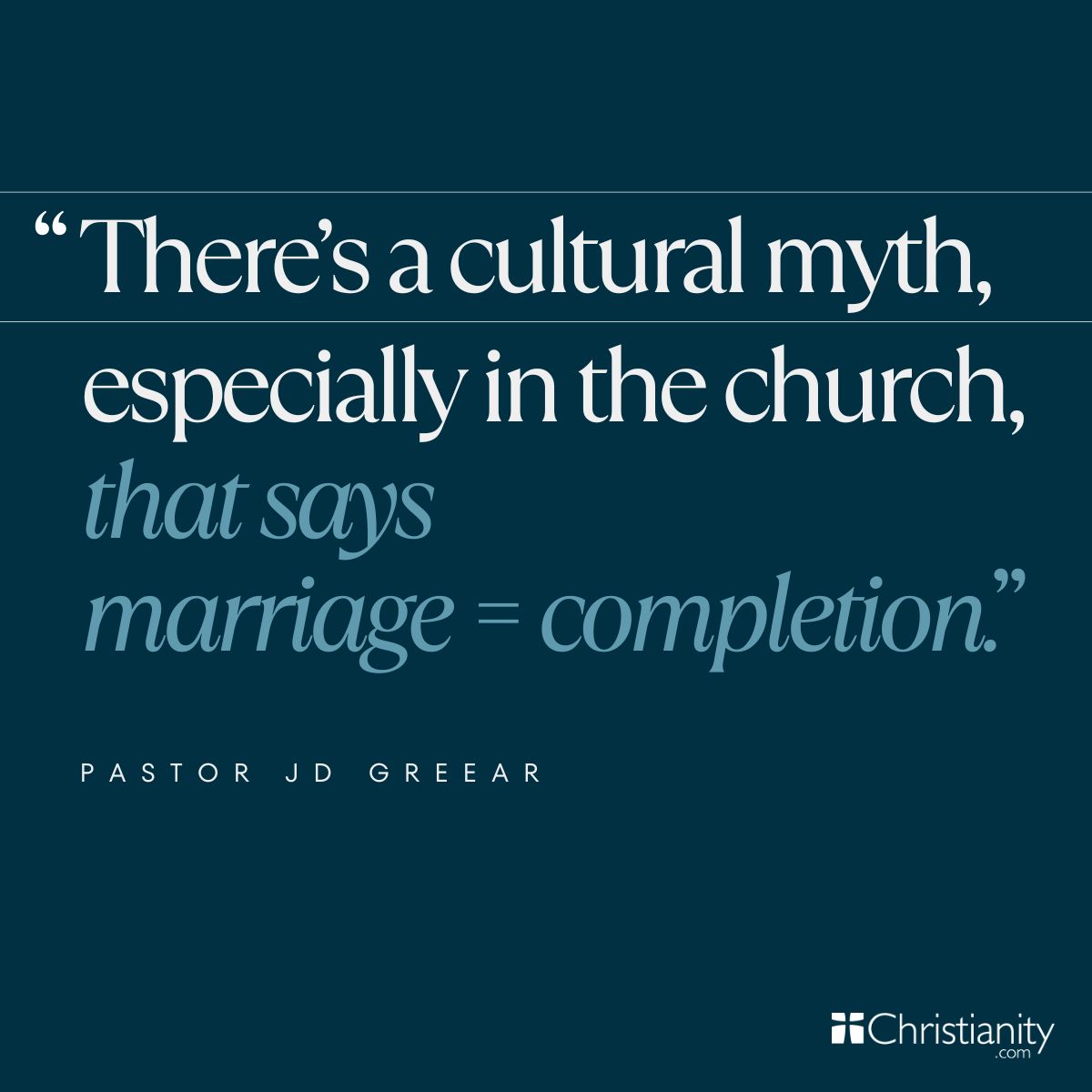
Did you know that this generation will remain single longer than any other generation in American history? The average age for an American male getting married now for the first time is almost 31; for women it’s 28.
Being single can be tough. And unfortunately, being single in the church can be even tougher.
My family and I have had various single people live with us over the years. One told me it felt like a lot of people in the church were always subtly pressuring her to get married. The sense she got was that if she wasn’t getting married, people assumed that something was wrong with her. Married people would say things to her like, “Don’t worry ... you’ll get married someday,” assuring her she wouldn’t have to stay in this obviously inferior stage forever. Or they’d say, “God just has to do some work on you before he brings you that special someone,” as if she had some unique flaw everyone knew about except her.
Many people in the church place marriage on a pedestal, either implicitly or explicitly saying that single people are second class in God’s kingdom. But the testimony of Jesus and the Apostles is exactly the opposite: Singleness isn’t second class in God’s kingdom.
There’s a cultural myth, especially in the church, that says marriage = completion. It holds to the idea that marriage (and having a close-knit biological family) is some kind of ultimate state for us. So if we don’t find that special someone to marry, we will have missed out on an essential part of a full and happy life. The only problem with this myth is that Jesus utterly refuted it several times in the Gospels, one of which is Mark 3.

It starts out with Jesus’ mother and brothers coming to where he was teaching. They called for him, and the people he was with told him. If this happened today, we’d expect the pastor to say, “Oh, well, family first. See you guys later.” In fact, we’d almost be scandalized if he didn’t say that. But Jesus says, “Who are my mother and my brothers?”
Imagine if I did that! “J.D., Your family needs you.” And I said, “What do you mean, ‘family?’ Who is my wife and who are my children? You all, listening to the Word of God right now, you are my family!” I don’t think it would go over well.
Was Jesus diminishing or ignoring his family? No, he was using hyperbole to teach an important lesson. In fact, Jesus had such a high view of the commitment levels involved in marriage and family that it shocked his disciples. Jews in Jesus’ day, for instance, had a whole list of reasons divorce might be permissible, but Jesus said in Matthew 19 that getting divorced for any reason except marital unfaithfulness was, in God’s eyes, like committing adultery. In 1 Corinthians, Paul would expand that list to include a couple of other reasons for divorce (namely, abandonment), but the point is that Jesus and Paul had a higher view of the commitment levels involved in marriage than anyone else at the time. So Jesus wasn’t necessarily anti-marriage.
Nor was he cold toward children. Again, Jesus put an incredibly high value on the responsibility of parents to care for their children, far beyond the people of his generation. In the first-century world, children were thought of as secondary; the needs of adults were far more important than those of the kids. So in Luke 18, Jesus scandalized everyone by gathering children to himself, prioritizing them over the adults who needed things from him. In Luke 17, he even said that if someone didn’t do right by their child, it would be better for them that a millstone be hung around their neck and thrown into the sea than have to face God’s judgment. Paul, in 1 Timothy, said that if a man didn’t properly care for his family, he was worse than a non-believer. In Mark 7, Jesus called the Pharisees hypocrites for using “religious obligations” as an excuse for not providing for their parents. So Jesus wasn’t anti-family, either.
So, if Jesus was more committed to marriage and more committed to family than his peers, why did it sound like he thought they didn’t matter? Because in relationship to our relationships in the church, they look so small that it’s almost like they don’t!
Rebecca McLaughlin put it this way: “He’s teaching us that our first identity as followers of Jesus is not biological, it’s theological.”
There’s another example of this In Luke 11, when a woman in the crowd Jesus was teaching called out, “Blessed is the womb that bore you, and the breasts at which you nursed!” What she meant was, “How great it must be to be related to you, Jesus! Can you imagine being Jesus’ mom?” But Jesus says, “Being my brother? My mom? Not that big of a deal. Being in my family and having my Spirit dwell in you? Huge deal.”
How awesome would it be to have Jesus in your ancestry tree? If that were true of me, I’d be working that into any conversation I could. “Oh, you were related to some of the Pilgrims on the Mayflower? Well, my great-great-great-uncle was Jesus.” I mean, anyone who knows me at all knows that if you give me half a chance, I’ll tell you that my great, great, great, great, great uncle was Davy Crockett. If you bring up Tennessee, Texas, or the nineteenth century in general—I’ll find a way to slip that into conversation. I’ll even bring it up if none of those topics is in play (like I just did here!). And yet, Jesus says, it would be more beneficial to have Jesus’ Spirit in us than Jesus’ name in our family tree.
Jesus says, “If anyone comes to me and does not hate his own father and mother and wife and children and brothers and sisters, yes, and even his own life, he cannot be my disciple” (Luke 14:26). Hate? Jesus said we can’t be his followers unless we hate our father and mother and wife and children? No … and yes. His point isn’t that we should actually hate our parents or our spouses or our kids, but compared to the value we place on him and our spiritual family, our commitment to our biological family should seem like hate.
This is radical: The nuclear family is not the center of God’s kingdom. Yes, the family unit may be the building block of society. God designed it that way. But it is not the center of his church. It is not the building block of his kingdom. In the end, marriage and the nuclear family will pass away. C.S. Lewis once said, “We do not know, except in glimpses, the other thing which, in Heaven, will leave no room for them.”
John Piper, talking about Jesus’ shocking words in Mark 3, said:
Jesus called out a new family where single people in Christ are full-fledged family members on par with all others, bearing fruit for God and becoming mothers and fathers of the eternal kind. Marriage is temporary, and it will finally give way to the relationship to which it was pointing all along: Christ and the church—the way a picture is no longer needed when you see face to face.
In God’s kingdom, singleness isn’t second-class. Christopher Yuan says, “Our earthly families are temporarily bound by blood, but the family of God is eternally bound by the blood of the lamb.” In Mark 12, we learn that in heaven, marriage, and biological family don’t exist. What does exist is something that exists even today: the fellowship of believers with God—and with one another.
Photo Credit: SWN Design

Pastor J.D. completed his Ph.D. in Theology at Southeastern Baptist Theological Seminary. He serves as a member of the Board of Directors of Chick-fil-A, serves as a Council member for The Gospel Coalition, and recently served as the 62nd president of the Southern Baptist Convention. Pastor J.D. and his wife Veronica are raising four awesome kids.
"Editor's Note: Pastor JD Greear's "Ask the Pastor" column regularly appears at Christianity.com, providing biblical, relatable, and reliable answers to your everyday questions about faith and life. Email him your questions at [email protected]."

.jpg)

